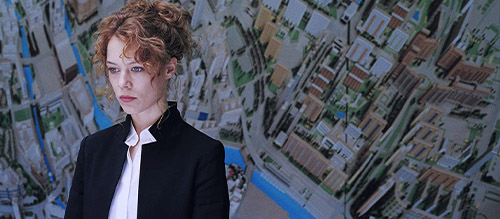
Undine (2020)
Director: Christian Petzold
Screenwriter: Christian Petzold
Starring: Paula Beer, Franz Rogowski, Maryam Zaree, Jacob Matschenz, Anne Ratte-Polle
Undine, the 2020 Christian Petzold drama set in Germany’s capital city of Berlin, and nominee for the Berlin International Film Festival’s coveted Golden Bear (Best Film Award), is a film that operates both as a social-realist European drama and a much further reaching fantasy that seeks the disentanglement of themes as personal as romantic love and as cultural as the history of an entire nation. Perhaps more intrinsically linked to contemporary Berlin than any film of international acclaim released in the past decade, Undine offers an inventive but at times frustrating mix of the literal and the allegorical, of the realistic and the fantastical, but ultimately fails to translate the depths of its intentions.
The titular Undine (Paula Beer) is a freelance historian working for Berlin’s senate. Her role is to discuss the historical development of the city’s architecture and its fascinating connection to the city’s historical division between West and East, between capitalism and socialism. We meet her at a coffee shop, where we slowly come to understand that the man sat across from her is her cheating partner (Jacob Matschenz). She declares she’ll have to kill him if he leaves her, but he chooses to leave anyway, causing Undine to search for him throughout the coffee shop and leading her to a meet-cute with a mysterious but interesting figure, a diver by the name of Christoph (Franz Rogowski). From there, a relationship blossoms and Undine becomes torn between the impact of her past and the prospects of her future, her journey embodying the push and pull of the historic and the futuristic within the city of Berlin itself.
Paula Beer is utterly watchable from the very first frame, director Petzold photographing the actress through a loving lens that brings to light nuances of her performance that etch up the emotional investment in her journey. She wears sadness with a class not unlike early Eva Green performances, yet blossoms in moments of happiness, her win for Best Actress at the Berlinale offering some deserved recognition for a performance that transcends her relative youth (she turned 25 in 2020). It’s a performance deserving of the role, which includes an astute mix of sadness, pride, romance and viciousness, and would be an enticing prospect for any actor worth their salt. Opposite her, Franz Rogowski is also noteworthy in his own portrayal, the actor’s distinct facial features as photographable as ever, in or out of the industrial diving gear he wears at intervals throughout.
Together, they form a believable bond, one which is explored in endearing, realistic moments that speak of their characters’ mutual respect. Their relationship is as watchable as the one in ‘Normal People’ at first, their interactions and sorrow at missing one another being tangible and relatable, but as the film goes on and Petzold’s intentions are turned in another direction, the relative simplicity of the pair’s relationship is substituted for more challenging material, the kind of which is likely to prove divisive with audiences.
As previously expressed, Undine is a film pulling in two directions, and while the relationship between Undine and Christoph is interesting in its own right and does a solid job of presenting the allegory of Undine being representative of Berlin itself, Christian Petzold isn’t satisfied with the simple, Franco-European type drama, and after several large hints at something more fantastical, ultimately drives his film down a different and more challenging route.
In the film’s second half, Undine unravels into a dark fantasy that can be best explained as an inverse of the mermaid myth. Water, which is displayed as an important factor in the couple’s relationship, takes an all-new turn as drama and tragedy strike, Petzold evolving the film’s relative realism into something more illusory. Undine becomes something of a force of nature, while Christoph faces his own somewhat fairy tale-like challenges, Petzold homing in on earlier metaphors and presenting them as physical manifestations, aptly substituting Undine for Christoph as the new focus of his work.
It’s difficult to truly analyse Undine without spoiling its biggest and arguably its best moments, but as an overall piece there is a genuine sense of a filmmaker very much attempting to create something unique and meaningful. Undine may not go where a lot of people want it to, and even when it does there may be some allegorical and metaphorical elements that fail to make it through the absurdity, but there is a pleasure to be found in exploring its attempt and a genuine connection to be forged with its leading duo.
15/24

